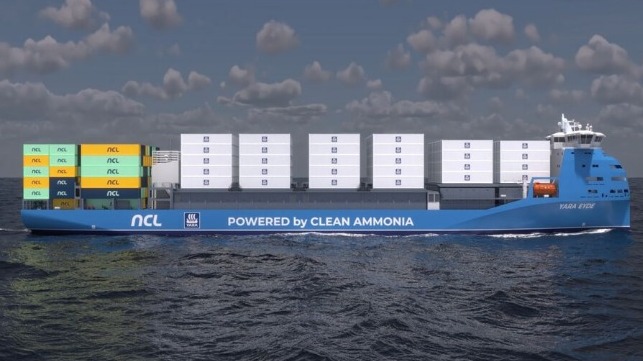Norwegian Project Plans for World’s First Ammonia-Fueled Containership

An innovative project in Norway seeks to build what could become the world’s first ammonia-powered containership. The vessel, which they expect to enter service by 2026, will be built in a partnership between Norway’s North Sea Container Line and ammonia-producer Yara International and its subsidiary Yara Clean Energy with the support of the Norwegian Government through its Enova investment fund.
The companies did not provide specific details on the size of the vessel but reported it is being designed for the trade route between Norway and Northern Europe. They said it would be optimized for service between Oslo and Brevik in Norway and Hamburg and Bremerhaven in Germany. It will be operated by NCL Oslo, a new partnership being launched between the companies.
“We are happy to be able to collaborate across sectors and show that decisive emission cuts are possible,” said Svein Tore Holsether, CEO of Yara International announcing the project. “The green journey started with the Yara Birkeland, the world's first self-driving electric containership, and now we continue it with the Yara Eyde, which will be the world's first containership on pure ammonia."
Plans for the vessel call for it to operate on ammonia from its introduction, which would make it one of the first in the world. Several engine manufacturers around the world have achieved initial results in the design of engines and fuel supply systems that will operate on ammonia while several demonstration projects are getting underway for ammonia. The race is on among companies to achieve the first commercial ammonia-fueled ship.
In the application to Enova, the project said the containership would be “powered by ammonia with a battery pack of 250 kWh and the option of shore power.” The companies reported that the operation of the new containership between Brevil and Europe will remove 11,000 tonnes of CO2 emissions per year.
The project has been awarded approximately $3.6 million by Enova as part of a total $63 million program of grants announced at the end of September for projects to decarbonize shipping. Viridis Bulk Carriers is also receiving an Enova grant for two 4,700 ton cargo ships that they are targeting to introduce by the end of 2025 also fueled with ammonia. Azane Fuel Solutions in collaboration with Yara Clean Ammonia is also receiving a grant for the development of ammonia bunkering while other projects funded by Enova focus on hydrogen and battery-powered shipping as well as carbon capture aboard ships.
The plans call for the containership to be named Yara Eyde, in honor of Norwegian industrialist Sam Eyde. Eyde played a crucial role in the industrialization of Norway in the early 20th century through the large-scale development of hydroelectric power plants in Norway and was the founder of several of Norway's largest corporations, including Yara, Hydro, and Elkem. He was also a partner of Kristian Birkeland for which the companies named their prototype autonomous, electric vessel.
It is the second next-generation shipping project for North Sea Container Line. Last year they announced the order of 1,300 TEU methanol-fueled containerships. They plan to launch the vessels which are building in China on the North Sea in 2024.

that matters most
Get the latest maritime news delivered to your inbox daily.
Yara reports it will contribute to the development of the ammonia-fueled shipping market through its efforts at funding the development and logistics segment for ammonia as a marine fuel. Yara Clean Ammonia will supply the Yara Eyde with ammonia that is produced fossil-free or almost carbon-free. They are focusing on ammonia produced from renewable energy or natural gas where up to 95 percent of the CO2 emissions are captured and permanently stored.
Yara Clean Ammonia is working with Azane Fuel Solutions, a storage and bunkering network, in the development of ammonia supply in Norwegian and eventually Scandinavian ports. They highlight it will make ammonia available as a marine fuel and can also contribute to achieving Norway's goal of cutting emissions from the offshore sector.
